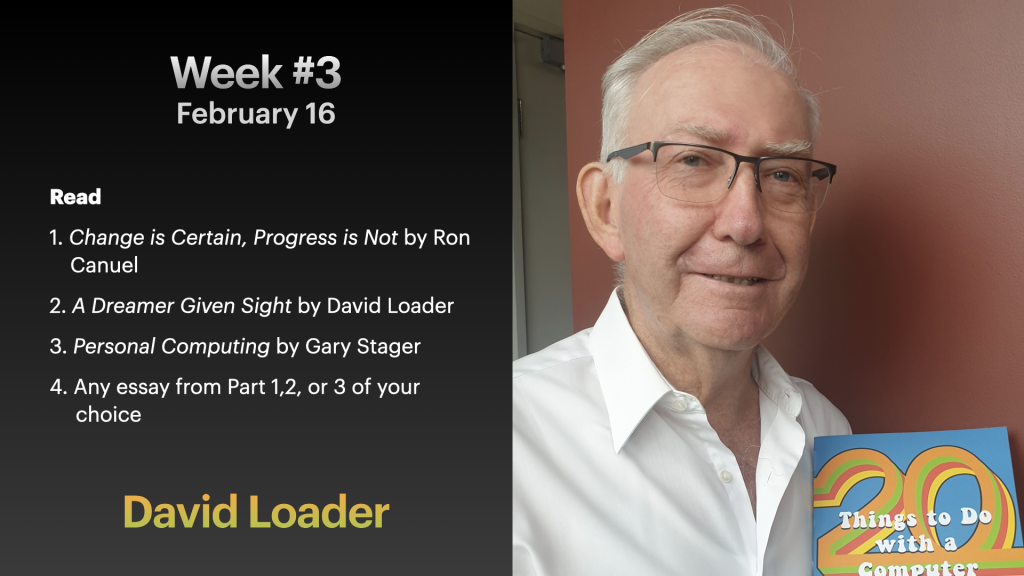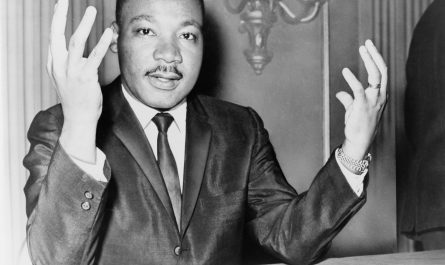
My friend David Loader is arguably the most significant school principal of the past fifty years. In 1989, he committed his large Australian school to constructionism and 1:1 computing – and that is hardly his most audacious achievement. Ron Canuel is widely considered one of Canada’s leading voices in public education.
It will be great to have two spectacular school leaders, Ron Canuel & David Loader, with us on Wednesday for our book study discussion. (Feel free to compare and contrast them to other school leaders.) Ron and David both contributed essays to our new book, Twenty Things to Do with a Computer Forward 50: Future Visions of Education Inspired by Seymour Papert and Cynthia Solomon’s Seminal Work.
Details for joining us and preparing for the discussion follow.
For those of you over-achievers, here are a few articles about his leadership in bringing constructionism to life across schools.
Suggested (mind-blowing) reading
- The Audacity of Sunrise – David’s 1990 account of 1:1 computing implementation at his school.
- Reconstructing an Australian School – David’s 1993 contribution to his school’s book about their 1:1 implementation
- Computers for Kids … Not Schools – By Gary Stager in 1993
- Laptop Schools Lead the Way in Professional Development – Gary’s Stager’s 1995 article from the pages of Educational Leadership
- Laptops as a Vehicle for Making Constructionism Real – Gary Stager paper from 1996
There’s even a book!
Bob Johnstone’s book, Never Mind the Laptops: Kids, Computers, and the Transformation of Learning, chronicles the evolution of the 1:1 computing movement Loader led.
About David Loader
David Loader is a Principal Fellow in the Melbourne Graduate School of Education, Melbourne University and provides consulting, design, evaluation, and strategic goal setting services for school leaders and educational organizations. David is a consultant to Girl Guides Australia, reviewing their Australian Guide Program. As part of Daintree Associates, David runs conferences and study trips for school principals in China.
David was a school principal for 32 years: Kinross Wolaroi College, Orange 1971-8; Methodist Ladies’ College, Melbourne, 1979-1996; and Wesley College, Melbourne, 1997-2002. David led Methodist Ladies’ College to adopt laptops for all students in 1989, the first school in the world to do this.
He is the author of three books. The Inner Principal: Reflections on Educational Leadership, recently re-published, provides insight and analysis on being a school leader in times of change. Jousting for the New Generation: Challenges to Contemporary Schooling provides a critique of modern day schooling. Our School Our Future, co-authored with Prof. Brian Caldwell is designed to assist school leaders in a future-facing planning process.
David is a Board member of Swinburne University and Cornish College, Melbourne. He chairs the Research Committee for the de Bono Institute and is on The Senatus of The Cairnmillar Institute.
In 1999, the Australian College of Education awarded him the Sir James Darling Medal and in 2008, David received the Gold Medal from the Australian Council for Educational Leaders.
In 2000, he was awarded the Centenary Medal ‘for outstanding services to education’ and in 2010 was awarded the Medal of the Order of Australia (OAM) for distinguished services to education, as a principal, mentor and author.
Join colleagues, Gary Stager, and guest experts in conversation about a critically important new book!
Last week’s discussion of our new book, Twenty Things to Do with a Computer Forward 50: Future Visions of Education Inspired by Seymour Papert and Cynthia Solomon’s Seminal Work, reminded me what attracted me to educational computing and the potential of schooling. The joy and radicalism of the conversation moved me deeply and reminded me how important it is to find one’s tribe.
Educators from their 30s to 90s discussed powerful ideas with great joy and optimism. Legendary educators, Dan Lynn Watt and Molly Lynn Watt were inspirational as were the contributions made by the participating educators. Cynthia Solomon was profound when she pointed out that “We know what children are capable of doing. They’re capable of surprising you!”
I was deeply moved by very fine teachers celebrating a student Aha! moment experienced thirty-five years ago. The glee, pride, and love expressed in such moments of crystal clear recollection is no trivial matter. This fills my heart with emotion and propels me to keep striving to make the world a better place for children.
There are two more chances for you to participate in the exchange of powerful ideas. This week’s book study guest stars will be Ron Canuel and David Loader, two extraordinary school administrators who are not just educational visionaries, but public intellectuals and advocates.
In 1989, eighteen years after the publication of Twenty Things to Do with a Computer, David Loader, principal of the Southern Hemisphere’s largest girls school, committed his school to providing a personal laptop computer to every student. This was not an edtech initiative, the expectation, quite often realized, was that every one of his teachers would use the student laptops in the spirit set forth by Papert and Solomon. 1989! What if I were to tell you that having one laptop per school child 32-33 years ago is hardly David’s most extraordinary accomplishment as a school principal? The lessons I learned working with him over these decades could fill a book. One of his actual books, The Inner Principal: Reflections on Educational Leadership, remains one of my favorite education books ever.
Ron Canuel is another courageous school administrator who a little more than a decade after Loader, provided a laptop for every student in Quebec’s largest English speaking school district. His efforts remain one of the most significant implementations of personal computing in North America (certainly pre-pandemic).
Both David and Ron are not only respected education leaders, speakers, authors, and consultants, they unapologetically stand on the side of children and view school leadership as an outspoken act of citizenship. You do not want to miss talking with them!
Preparing for Session #3 on February 16th
- Please get yourself a copy of Twenty Things to Do with a Computer – Forward 50 if you have not already done so. The book is now available in Kindle, softcover, and hardcover editions.
- In preparation for Session #3, please read the following essays.
- Change is Certain, Progress is Not by Ron Canuel
- A Dreamer Given Sight by David Loader
- Personal Computing by Gary Stager
- Any essay from Part 1, 2, or 3 of the book. It is your choice.
- Extra-credit! Read David Loader’s bio and some of the articles associated with the early days of 1:1 computing.
Recommended resources related to recent discussions
- Books & video for learning more about the Reggio Emilia approach
- Science educator David Hawkins had a significant impact on the thinking of many progressive educators, including Seymour Papert, Deborah Meier, Carla Rinaldi, Lella Gandini, Eleanor Duckworth, and Loris Malaguzzi. His essay, Messing About with Science is a seminal document in the history of progressive education.
- Seymour Papert and George Franz’s 1983 paper, Computer as Material: Messing About with Time, is equally worthy of your attention.
Join Dr. Gary Stager, peers, and surprise guests in a weekly synchronous discussion of the powerful ideas, challenges, and inspiration found in a variety of the new book’s essays. Each week, a couple articles will be assigned and community members will be encouraged to choose other chapters for discussion. There’s something for everybody in this book!
Registrants will be able to participate in each week’s conversation, join the online community, and access video of the discussions. Four sessions will commence at 8 PM Eastern/5 PM Pacific on Wednesdays in February.
Discussion Themes
February 2: Twenty Things to Do with a ComputerFebruary 9: The Struggle is Real- February 16: Personal Computing
- February 23: Future Visions
Registrants will receive links and instructions 3 hours prior to the next session.
I could not be prouder of the new all-star book I just published, Twenty Things to Do with a Computer Forward 50: Future Visions of Education Inspired by Seymour Papert and Cynthia Solomon’s Seminal Work. You now have an opportunity to discuss the powerful ideas in this book online during February in a free study group. The book is now available in Kindle, softcover, and hardcover editions!
Twenty Things to Do with a Computer Forward 50, is a celebration of the vision set forth by Seymour Papert and Cynthia Solomon a half-century ago. Four dozen experts from around the world invite us to consider the original provocations, reflect on their implementation, and chart a course for the future through personal recollections, learning stories, and imaginative scenarios.
Veteran educator Gary Stager, Ph.D. is the author of Twenty Things to Do with a Computer – Forward 50, co-author of Invent To Learn — Making, Tinkering, and Engineering in the Classroom, publisher at Constructing Modern Knowledge Press, and the founder of the Constructing Modern Knowledge summer institute. He led professional development in the world’s first 1:1 laptop schools thirty years ago and designed one of the oldest online graduate school programs. Gary is also the curator of The Seymour Papert archives at DailyPapert.com. Learn more about Gary here.

